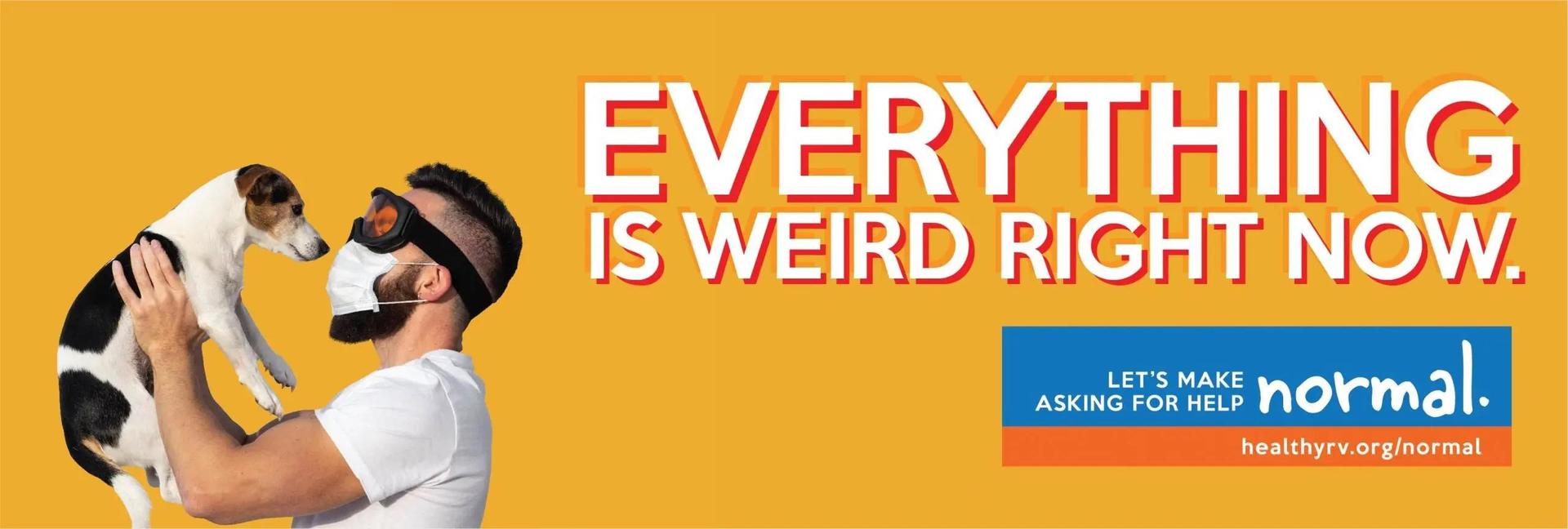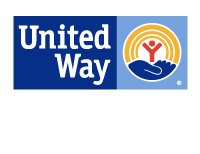
Help Everyone in Roanoke Valley Thrive
Your donation helps more people thrive. Thank you for making our community stronger!
Everything is weird right now
It's not your imagination. Things are weird right now. But they're weird for everyone, and you are not alone in wondering how to navigate this moment.
The following tips and resources can help things feel a little more normal, with connections to local organizations that can provide support for your mental and physical health, as well as some simple things you can do at home to practice self-care.
While you're here, please consider sharing this page with a friend or family member who may be feeling that things are weird right now. Let's make asking for help normal.
If you are in immediate need of medical assistance, please dial 911. If you are facing a financial, house, or medical crisis, please dial 211 for the Council of Community Services helpline.
Healthy Body
- Exercise: Get up from the desk, couch, or dining room table and move your body. Explore your neighborhood, a nearby park, or a regional trail. The Roanoke Valley is home to hundreds of miles of hiking trails, most neighborhoods are home to one or more local parks, and even walking underused alleyways can create a sense of exploration and discovery in your own backyard.
- Nourish your spirit and reduce stress by spending time in nature. Read a book or listen to music in your backyard, take a walk along the Roanoke River Greenway, or spend time in prayer while watching a sunrise.
- Get enough sleep. Got to bed 30 minutes earlier than usual. If you generally cut your sleep short because you have too much to do, this is a great time to be well-rested.
- Pull out an old cookbook or explore recipes online and get the family involved in trying something new while keeping everyone nourished. Assigning each family member a meal plan can keep the family connected while building new skills. Or, explore a different cuisine each night of the week, cooking for yourself or getting takeout from one of the valley's many diverse international restaurants and grocers.
- While it can feel like an easy fix, avoid turning to alcohol or drugs to cope. In weird times like these, using substances to deal with anxiety can lead to long-term issues of addiction, which just means you're still going to feel weird even when things aren't weird any more. If you are concerned that you or a loved one may be developing an addiction, one resource for assistance is the SAMHSA's National Helpline, 1-800-662-HELP (4357) or by visiting SAMHSA's website here.
Healthy Brain
- Create a checklist to help manage your day. Telework schedules and virtual learning can make time management hard. Create some structure for your day by creating a checklist for important tasks. You can even make the first item on the list "Make daily checklist" just so you have something to cross off right away - we won't tell anyone.
- Journaling can be a good way to organize your thoughts and address the things that are making you anxious. Often, the act of writing something out can make that thing seem less overwhelming. Plus, you'll be able to look back one day and be proud of how well you handled everything.
- Don't be afraid of taking advantage of mental health resources. Sometimes, people need personal trainers when they are getting their bodies into shape. Think of counselors and therapists as personal trainers for your brain and here are proven benefits.
- In times of crisis, many people turn to faith practices to find guidance and meaning. The simple practice of faith, regardless of the religion or belief system followed, has been shown to improve mental health. If you are uncomfortable with religion or unsure where to begin, use this opportunity to ask your friends and neighbors about their faith practices and learn about where they find comfort.
Healthy Connections
- Maintain and encourage connections with family and friends. Social distancing can make physical connections difficult, but phone, video calls, and even texts to check in on friends and relatives can be important. Don't forget the power of correspondence - email and even old-fashioned letter writing can be both therapeutic AND appreciated by the recipient.
- Go through your home and find five things you never use. Donate them to a charity or give them away to friends and neighbors. Use this as an opportunity to make sure your home is filled with meaningful connections to memories.
- We are all spending a lot more time online these days, which isn't necessarily bad, but it can become easy to follow accounts that are more focused on making us feel outraged, angry, or scared. Unfollow accounts that make you feel this way and focus on social media connections that bring you joy.
- Connect to your neighborhood or community through volunteering. While social distancing has made some of the traditional volunteer opportunities impossible, there are still many ways to serve. Reach out to your child's school to look for opportunities with meal delivery, shelters and food pantries still need assistance serving the less fortunate, organize a community clean up via your neighborhood group or just take a bag with you and pick up litter while you walk. The world is weird right now, but you can still leave it just a little bit better than when you found it.
For COVID-19 related support and mental health services, call or text the Virginia COPES warm line at 877-349-6428.
Other support for mental health and substance use services:
- Blue Ridge Behavioral Healthcare: 24 Hour Crisis Line, 540-981-9351; Referral and Assessment, 540-343-3007
- CONNECT: 24/7 Evaluation and Assessment, 1-800-284-8898 or 540-981-8181
- National Suicide Prevention Lifeline: 1-800-273-8255
- Crisis Text Line: Text TALK to 741741
- Veteran's Crisis Line: 1-800-273-8255 Press 1
- VA Veteran and Family Support: 1-877-285-1299
Be In the Know - Get Connected!
Sign up to receive information about how your support changes lives in our community!
